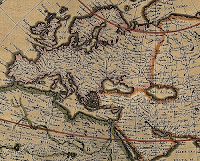I'm not a big fan of the scientific method as a springboard for high school science class, at least the dogmatic form presented in textbooks--smacks of religious fervor, but I'll save that for another day.
I want to hit the kids with some version of this: how do we know what we know? (Do not call it epistemology, you'll only frighten the children.)
I don't want to go the existentialist route either, I'll only feed this generation's version of Trent Reznor fans.
In the past I gave a quiz involving a variety of scientific myths, and while it's fun, and it's big on the "Oooo..." factor, I get the sense that it the myths return into their universes before the exit bell rings.
So here's my vague notion of what I want to do. Pick something they "know" all about, then ask them to "prove" why it's true. (I have a sudden infatuation with quotation marks.)
I'm generating a list of questions. I want to know how the students know the answer beyond appealing to a source beyond their senses and their brains. I want questions that can be at least partially solved without leaving school grounds.

- How do you know the world is round?
- Might take a few months to develop the data, but I think we can do this in class
- How do you know something is alive?
- I need to bring critters and plants in early this year, first day if possible
- How do you know how old you are?
- This could get interesting if I outlaw birth certificates--could lead to a good discussion about sources (parents) and how reliable they are ("My Dad says evolution is devilspeak!")
- How many toes are in the room?
- Don't think I'll allow them to go for direct observation here, don't want to embarrass anyone, but does make for a good discussion on inductive inference.










No comments:
Post a Comment